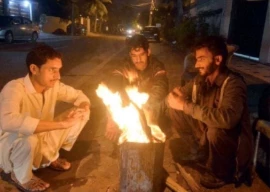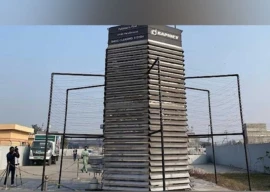
The common thread at a one-day awareness workshop titled “Safer water, better health” was the dysfunctional sanitation system in the villages of Swat after the 2010 floods.
The workshop in Madyan, Swat, organised by the Imran Khan Foundation (IKF) in collaboration with the Sarhad Rural Support Programme for flood-hit villagers and volunteers from Qandeel, Aryana and Damana villages, aimed to impart practical skills on water safety and sanitation.
Fazal Subhan, a social activist from Qandeel village, among the worst-hit in the region in the 2010 floods, said they have been deprived of clean drinking water or a functional sanitation system since the floods wreaked havoc upon their village.
“Floods not only destroyed our houses and agricultural land, but also washed away our water supply schemes. Since then we have been living at the mercy of God.”
Residents of the three villages have to travel quite far to fetch drinking water from various springs.
“As there is no proper system for storing spring water,it is easily contaminated. If we consume the water, there is greater risk of an outbreak of cholera, typhoid, scabies and stomach disorders,” said Imran Ali, a resident of Aryana village.
According to a global survey, 80 per cent of water-borne diseases and 40 per cent of deaths caused by them occur in Pakistan.
Habibullah, another participant, said that the sanitation system was destroyed by the floods, with sewer overflowing in the streets. “There are many little ponds of stagnant water in our village and the pipelines are broken to this day,” he said.
At the end of the workshop, a committee was formed comprising social activists and volunteers from the villages to improve the quality of water and sanitation. An action plan was also developed to address water issues.
IKF Chief Executive Officer Naseemur Rehman told The Express Tribune that the most essential intervention after the floods was the provision of safe drinking water.
We are telling them what safe drinking water is, how water gets polluted and how to ensure that people in the villages can ensure that drinking water is safe,” he added.
Published in The Express Tribune, April 11th, 2012.
COMMENTS (3)
Comments are moderated and generally will be posted if they are on-topic and not abusive.
For more information, please see our Comments FAQ
1736506105-0/Untitled-design-(26)1736506105-0-405x300.webp)
1736504232-0/tom-(2)1736504232-0-165x106.webp)
1736502202-0/fizza-(3)1736502202-0-165x106.webp)

1736498370-0/Untitled-design-(25)1736498370-0-165x106.webp)

1736332856-0/Untitled-design-(20)1736332856-0-270x192.webp)



1736334465-0/sidra--(45)1736334465-0-270x192.webp)






water borne disease are common in flood hit areas. good step by IKF
Great initative, well done Imran Khan Foundation